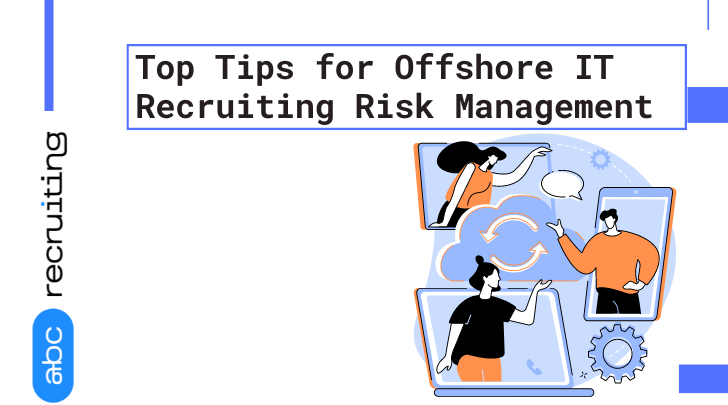How do you reap the rewards of a global talent pool while avoiding the pitfalls? Follow these best practices for risk management in offshore IT recruiting and you’ll increase your odds of success. Whether you’re new to distributed teams or an old pro, these strategies will help you navigate the complexities of cross-border hiring and get your offshore project off to the right start. Ready to build an all-star team without borders? Read on.
Conduct Thorough Due Diligence on Offshore Recruiting Partners
Finding the right offshore recruiting partner is crucial to mitigating risks in your project. Do your due diligence to evaluate potential partners thoroughly.
Check their experience and expertise in your industry and job functions. An established company with years of experience will understand the nuances of your roles and company culture. They should also have a solid network of candidates.
Ask about their screening and onboarding process. They should have a rigorous multi-stage screening process to assess both technical and soft skills. Look for partners that provide onboarding and relocation support to help new hires adjust to the job and environment.
Inquire about their compliance practices. Reputable companies will follow all local labor laws and codes of conduct. Ask if they’re certified or accredited by any industry associations. This helps ensure ethical practices and standards.
Discuss how they handle data privacy and security. Your company and candidate data should be kept confidential and secure. Ask about their security protocols and any third-party audits of their data privacy practices.
Check online reviews from their clients and candidates. Look for companies with a solid reputation and more good reviews than bad. But take extreme negative reviews with a grain of salt. Ask the company to address any concerning points.
Visiting the potential partner’s facilities in person is ideal. You can observe how they operate and interact with staff. See if the overall environment seems professional, secure, and supportive. However, in-person visits may not always be practical, in which case video calls are the next best option.
Conducting comprehensive due diligence on offshore recruiting partners will minimize risks and help you find the most ethical and capable company for your needs. With the right partner, you can build an effective global team.
Establish Clear Roles, Responsibilities, and Performance Metrics
To set your offshore IT recruiting project up for success, clearly define each team member’s role and what’s expected of them. Lay out specific responsibilities for the recruiting agency, HR department, hiring managers, and anyone else involved.
Establish key performance indicators (KPIs) to measure progress for each role. For the recruiting agency, it could be submitting a certain number of qualified candidates within the target budget each month. For HR, it might be contacting and screening candidates within 3 business days. Be as specific as possible.
Have regular check-ins, especially in the first few months of your partnership. Make sure all parties understand priorities, challenges, and next steps. Look for any roadblocks and course correct as needed. Consistent communication and feedback are key.
Don’t forget to also clearly define the job requirements, skills, experience, cultural fit, and compensation for each position. Provide examples of ideal candidates. The more details you can give, the better equipped your recruiting team will be to source excellent contenders.
To avoid surprises, determine how background and reference checks will be handled in advance. Will the agency conduct initial screenings or will your internal team vet each candidate? Establish a process for moving top talent through the interview rounds.
With distinct roles, measurable goals, open communication, and a structured candidate evaluation process, you’ll be primed to build an all-star offshore team. Success comes down to thorough planning, thoughtful execution, and trusting your recruiting partners. Take the time to get this right and you’ll reap the rewards for years to come.
Invest in Ongoing Communication and Relationship Building
Ongoing communication is key to successful offshore IT recruiting. As a project manager, make time to regularly check-in with your offshore recruitment partner via video calls. Discuss the progress of candidates in the recruiting pipeline, any challenges, and strategies to resolve them.
Build Rapport and Trust
Take time to get to know your recruitment partner’s key staff and build personal connections. Learn about their experience, skills, values, and work styles. Find common interests and share information about your own background as well. Over time, you’ll develop rapport, understanding, and trust in one another which translates into a highly productive working relationship.
Provide Clear Expectations
Be very specific about your requirements, priorities, processes, and timelines. Review job descriptions, candidate screening criteria, interview questions, reporting needs, and key milestones together to ensure full alignment. Ask open-ended questions to identify any areas of confusion. It’s much easier to get things right the first time than have to correct issues later on.
Share Feedback
Provide regular feedback, both positive and constructive, to help strengthen your partnership. Compliment what’s working well and express appreciation for their efforts and successes. If certain areas need improvement, address them promptly with specific examples and suggested solutions. Be open to receiving feedback in return to gain valuable insight into how you can better support them.
Problem-solve collectively
No project goes perfectly smoothly, so anticipate challenges and be prepared to problem-solve together. Discuss how to handle issues like scarce candidate availability, compensation negotiations, or changes in job requirements. Look at problems from multiple angles and suggest options to determine the best path forward. A solutions-focused mindset will help turn obstacles into opportunities.
Investing in ongoing communication and nurturing your relationship with an offshore recruitment partner pays significant dividends. When connections are built on mutual understanding and trust, challenges become easier to overcome and success more readily achieved. Make it a priority and you’ll gain a valuable long-term partner.
Ensure Data Privacy and Security Controls Are in Place
When working with offshore IT recruiting partners, ensuring data privacy and security is paramount. As the hiring company, you’ll want to make sure any sensitive data or intellectual property related to your projects, employees, or company are properly safeguarded.
Establish Data Security Policies
Work with your offshore partner to establish strict data security policies and protocols upfront. Be very clear about what data can be shared, how it can be used, and how it must be protected. For any sensitive employee or candidate data, require encryption, restricted access, and data deletion after a set time period. Regularly monitor that these policies are being properly followed.
Conduct Audits
Don’t just take the offshore partner’s word that data is secure. Conduct regular audits of their data privacy and security practices. Check that access to sensitive data is restricted only to essential personnel. Examine the physical security of their office locations. Review logs to verify proper encryption and other protections are in place. Audits are the only way to truly confirm your data is being safeguarded responsibly.
Use Secure File Sharing
Never share sensitive files via unsecure methods like email. Require the use of encrypted file sharing services that provide version control, audit trails, and access restrictions. Services like Citrix ShareFile, Dropbox Business, and OneDrive for Business can help ensure your files are shared safely.
Staff Training
Data breaches often happen due to human error, not technical flaws. Require your offshore partner to conduct regular data security training for all staff members who access your company’s sensitive information. Training should cover topics like proper handling/sharing of data, access control procedures, and how to identify/report data breaches. Regular refreshers will help keep data protection top of mind.
By taking a proactive stance on data security and verifying offshore partners have the right controls, technology, and staffing in place, you can mitigate risks to sensitive data in IT recruiting projects. Staying vigilant and conducting ongoing oversight of data practices will give you greater confidence in working with offshore partners.
Plan for Potential Disruptions and Have a Exit Strategy
Having a solid plan in place for potential disruptions and a clear exit strategy is key to mitigating risks in offshore IT recruiting. Things can change quickly, and you need to be prepared to make adjustments on the fly while also knowing when to pull the plug if needed.
Plan for Possible Disruptions
There are a number of issues that could disrupt an offshore recruiting project. Political unrest or natural disasters in the country where the recruiting is happening could grind things to a halt. There may be changes in laws or regulations around hiring foreign workers that impact your ability to recruit or onboard new hires. The recruiting firm you’re working with could go out of business or lose key staff members instrumental to your project.
Technology glitches, errors in job postings, or poor communication can also create obstacles. Build contingency plans for various scenarios to minimize downtime if disruptions occur. Have backup options for recruiting channels and partners in place. Review and test your systems and processes regularly to catch any problems early on.
Define Clear Exit Criteria
Going into an offshore recruiting project, establish specific exit criteria to determine if and when you need to end the partnership or bring recruiting efforts back onshore. Things like missed hiring targets, poor quality of candidates, increased costs, cultural misalignments or loss of control are all signs it may be time to exit.
Define exit criteria as objectively as possible, with measurable metrics around areas like:
- Number of qualified applicants or hires
- Cost per hire
- Time to fill open positions
- Retention rates of new hires
- Feedback from hiring managers
When multiple exit criteria are triggered or there are serious concerns that can’t be addressed, start transitioning recruiting back internally or finding a new offshore partner. It’s best to end things on your terms rather than drag out a project that isn’t yielding good results. Planning for disruptions and having a exit strategy will help ensure your offshore recruiting efforts are successful.




